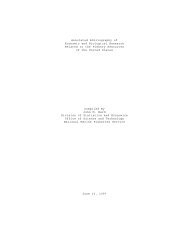West Coast Groundfish Observer Program Manual, Part2 - NOAA
West Coast Groundfish Observer Program Manual, Part2 - NOAA
West Coast Groundfish Observer Program Manual, Part2 - NOAA
Create successful ePaper yourself
Turn your PDF publications into a flip-book with our unique Google optimized e-Paper software.
APPENDIX P<br />
Response: This rule requires nothing specific regarding accommodations for observers. It merely<br />
refers to regulations already in place.<br />
Comment 12: Under the regulations that would be put in place by this rule, if all vessels were<br />
required to carry observers, all vessels would have to undergo safety inspections. This would mean<br />
the end of uninspected fishing vessels.<br />
Response: Under the assumptions made by the commenter, it is true that if all vessels were<br />
required to carry observers, all of them would have to be examined. At the present time, however,<br />
not all vessels are required to carry observers. NMFS wants fishing vessels carrying observers to fish<br />
safely, and undergoing USCG safety examinations promotes safety.<br />
Comment 13: What is the authority under which regional requirements governing observer<br />
accommodations might be developed? It is possible that these regional requirements could have<br />
unintended effects. For example, if the regional requirement deals with an issue that is judged<br />
subjectively, such as the adequacy of accommodations or food, the observer in applying that<br />
subjective judgement could keep a safe vessel from fishing.<br />
Response: The authorities under which regional requirements are developed are the Magnuson-<br />
Stevens Act, the Marine Mammal Protection Act, and the ESA. The addition of § 600.746(c)(3) to<br />
the rule should eliminate the problem of subjective judgement in conducting the vessel’s pre-trip<br />
safety check. It is not the intent of this rule to develop regional requirements.<br />
Comment 14: If a vessel has a valid USCG safety decal, there should be no question concerning<br />
the vessel’s safety. To then have an observer, who has the authority to refuse to board the vessel<br />
because of a safety deficiency, is double jeopardy.<br />
Response: If a vessel has passed a USCG dock-side safety examination, the regulations indicate<br />
that such vessel would be considered safe with respect to the USCG regulations. However, it is<br />
possible that some requirements with which the vessel was in compliance at the time of the USCG<br />
safety examination may not be met at the time of boarding by an observer for a specific trip. NMFS<br />
has added language at § 600.746(c)(3) that encourages the observer to examine some of the most<br />
important items that would be required in the case of an emergency at sea. This approach is<br />
consistent with that applied by USCG in recognizing that changes in vessel safety may occur between<br />
the time when a USCG safety decal is issued and the beginning of subsequent fishing. NMFS notes<br />
that this rule gives an observer authority not to board an unsafe or inadequate vessel. If such a vessel<br />
is operating in a fishery with mandatory observer coverage, the result of the observer’s refusing to<br />
board might be that the vessel would not be authorized to conduct fishing.<br />
Comment 15: This rule cites other regulations already in place, which suggests that regulations to<br />
effect safety are already in place. That being the case, this rule will not change anything.<br />
Response: This rule applies safety standards to all fisheries, including those for which no other<br />
observer regulations are in place. In fisheries with mandatory observer programs in place now, and<br />
for those in which mandatory programs may be established, this rule makes it a violation to fish<br />
without an observer aboard. This rule also requires vessels to submit to an otherwise voluntary<br />
inspection program to provide evidence of compliance with safety standards.<br />
Comment 16: This rule is an attempt to exceed the authority conveyed by the Magnuson-Stevens<br />
Act in that it goes beyond USCG regulations by authorizing an observer to refuse to board an unsafe<br />
vessel, thereby keeping the vessel from fishing legally. It goes beyond what is necessary to provide a<br />
safe environment for an observer, and it gives an observer authority that Congress gave to USCG.<br />
Response: NMFS believes that the rule does not go beyond what is required to provide a safe<br />
environment for observers and for other persons aboard fishing vessels. The intent of the rule is not<br />
to empower an observer with USCG enforcement official status; its intent is to provide a safe vessel<br />
for an assigned observer. The NMFS rule does not encroach on USCG authority to terminate a<br />
voyage. Rather, it conditions a vessel’s ability to fish safely by requiring compliance with existing<br />
regulations enforced by the USCG. The authority to regulate fishing activities properly rests with<br />
NMFS.<br />
Comment 17: If NMFS wants to require more than vessel-provided personal flotation devices<br />
(PFDs) and safety briefings, it should specifically identify the requirements that relate to observer<br />
A-44<br />
1/30/2004
















